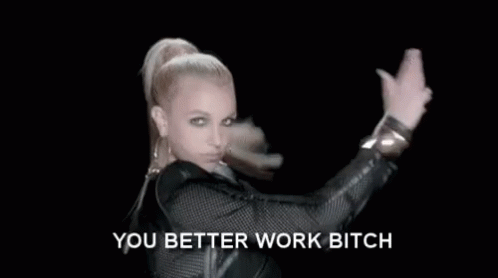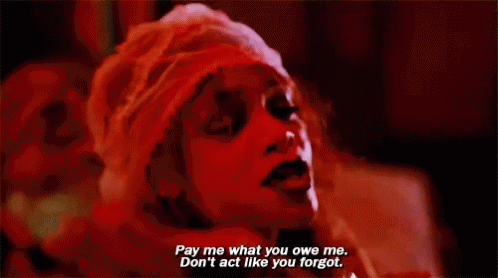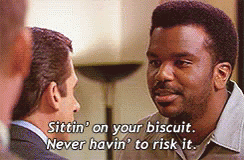
We all learned a tonne of stuff in high school. I can (or… could) use Pythagoras Theorum, I can tell you *pretty* much everything there is to know about the Russian Revolution(s) and I even got pretty good at the dreaded Beep Test. But you know what they didn’t teach in high school? Uhh…. Anything to do with superannuation.
Now, thanks to the coronavirus pandemic and subsequent economic recession, the word “superannuation” – and the option to withdraw it – is being thrown around like confetti.
But unless you’ve taken it upon yourself to read through the pages of the Australian Financial Review, or are lucky enough to have a friend or relative who knows their shit about money, you’ve probably got precisely *checks notes* no fucking idea what your superannuation is, or how to make it ~work~ for you.

For Starters, What The Fuck Is It?
Superannuation is a portion of your pay that gets set aside for your retirement before it reaches your hot, little hands (like tax). It’s kind of like how your parents used to make you put away a small chunk of your pocket money so you didn’t blow it on useless shit, but instead of your parents, it’s the government.
How Does It Actually Work?
The money is deposited into your superannuation account (either by your employer, or through a self-contribution), where it is then invested on your behalf.
Basically, the superannuation fund works like a bit of an investor on your behalf. They invest, then reinvest any dividends/growth over and over again until you eventually retire.
Because the money is continually being re-invested, you should end up with more money when you retire than you would if you just kept it in a bank.
Your super fund does all the hard work of actually investing it for you, but you get to choose low, moderate or high risk options, depending on your individual circumstances (but more on that later).
When And How Much Should I Be Paid?
If you’re over the age of 18 and earn more than $450 per month (before tax), your employer should be contributing at least 9.5% of your ordinary income (minus overtime or bonuses) into your superannuation account as part of the ‘super guarantee‘ (SG).
Employees under 18 who earn over $450 per month also need to work a minimum of 30 hours per week to be eligible.
It doesn’t matter if you’re full-time, part-time or casual, as long as you meet the age/minimum earning requirement.
Your employer must pay your super at least every three months, but they can pay more frequently if they choose.
What Do I Do If I’m Not Getting Paid?
For the love of God, FIGHT. FOR. IT.
At the end of the day, this is YOUR money, and more importantly, it’s the money you’re going to live off when you’re old and grey. So don’t let your employer (or ex-employer) get away with not paying it.
If you think you’re not being paid properly, check your payslips and give your super fund a call to make sure the payment has been made. As always, give your boss a chance to fix the error themselves before you contact the ATO.
If you STILL haven’t been paid, contact the ATO Superannuation infoline on 13 10 20 (this is an ATO issue, not a FairWork one). You can report an employer on the ATO website here, or read more about their process here.
It’s painfully common in hospitality, and many people just don’t bother fighting it (especially if it’s a previous employer). But this is your money, so to quote Rihanna – pay me what you owe me.

It’s important to note that if your former employer goes into liquidation, the ATO can no longer chase your missing super payments – so get it sorted now, because you don’t want to miss out on money that’s rightfully yours.
What Benefits Do I Get For Self-Contributing?
If you’re young and new to the workforce, you probably don’t have truck-loads of extra cash to throw around, but that doesn’t mean you shouldn’t at least *consider* self-contributing to your super through ‘salary sacrificing‘.
Basically, the government allows you to sacrifice a portion of your pre-tax income for superannuation contributions. If you choose to do this (and organise it with your employer) you can get a bit of a tax break because the contribution will only be taxed at 15% (the super rate), not your usual marginal tax rate (19-45% depending on your tax bracket).
Depending on your income, you may also be eligible for the low income superannuation tax offset (LISTO) of up to $500 per year if you earn below $37,000. You can read more about LISTO here.
To put it extremely simply – thanks to compounding interest – the earlier you add to your super, the more money you’ll have in the long run. But obviously, topping up your super is just one of many ways to invest your money, so it’s wise to seek professional advice before making any major financial decisions.
How The Hell Do I Choose A Super Fund?
If you’ve ever had a job, you probably just signed up to whoever your employer chooses for their superannuation, and there’s a chance you’ve got more than one account already (more on that later).
I know it seems like way too much effort to actually research different funds, especially if you’re already with one. But it can actually make a pretty big difference in the long run, so it (literally) pays to check.
When choosing your super, you should consider the following:
- Investment options (risk) – Does your chosen super fund give you the option to invest at a risk level that you’re comfortable with?
- Fees – How much are the annual fees?
- Control – If you know nothing about investing, you’ll probably want minimal control. But if you’re interested in it, you could opt for a fund that gives you a bit more power.
- Ethical choices – Don’t want to invest in fossil fuels or other bad stuff that doesn’t align with your morals? Dont! You can choose specifically ethical funds.
There are plenty of websites that allow you to compare different funds like Canstar and Finder.
What About Risk vs Return?
A 2017 MLC Wealth Sentiment Survey revealed that as many as 1 in 4 Australians don’t know what their superannuation risk profile is. And by not knowing, you could potentially be missing out on thousands of bucks in the long run.
“As an example of the difference it could make, a woman aged 25 on $80,000 a year in a conservative risk profile until she’s 70 could improve her super balance by around $294,000 if she adjusted her profile according to her circumstances and life stage,” MLC Customer Experience Manager Lara Bourguignon told NAB at the time.
Like the name suggests, your super risk profile determines what sort of investments will be made on your behalf. While a conservative risk profile is less likely to see a loss, it is also likely to give a lower return overall. Similarly, an aggressive/high growth profile is considered high risk, but also has the potential for a much higher long-term return.
There’s no right or wrong when it comes to choosing your risk profile, it all depends on your individual circumstances. If you’re young, have a stable income and minimal financial responsibilities or kids, you might want to consider a higher risk option.
It’s worth discussing your options with a financial advisor or your super fund, but it’s important to remember to adjust your risk profile as your circumstances change. When you’re organising your tax return every year, it’s probably smart to take a quick look at your super risk profile to make sure it still reflects your current circumstances.

Why Do I Need To Consolidate My Super?
This part is super quick, but very important: if you’ve had multiple jobs, make sure to check that you don’t have multiple superannuation funds.
You get charged fees with every account you have, so consolidating them into one fund will save you money overall.
If you’ve got multiple funds, obviously consolidate into the fund that suits your needs the best. But it’s important to check for any exit fees you may incur for leaving a fund.
You can consolidate your super using the ATO online services via the myGov website. For more information on how to manage and consolidate your super using myGov, you can check the ATO website.
How Often Should I Check It?
If you’ve made it this far, you’ve probably made sure that you’re happy with your super fund details. So how often should you check it?
It’s important to check your account semi-regularly to make sure your payments are actually going through properly. Although your payslip technically shows your super contributions, it’s important to confirm that your boss has actually paid this to you.
However, if the thought of losing money scares you, it’s wise not to check your super *too* much (especially during the pandemic/recession).
According to the ABC, the average balanced super portfolio lost 10-12% between February and March as a result of the coronavirus. I know it sounds scary, but superannuation analyst and SuperRatings CEO Kirby Rappell has urged young people not to panic.
“You’re not going to be touching your super for another 30 or 40 years, this will be in the rear-view mirror well and truly, so it’s just about trying to remain calm,” he told ABC.
To put it simply, you should check your super often enough to know that everything is working as it should but not so often that you’re worried about small changes in its performance.
The Economy Is Turning To Shit, Should I Withdraw My Super?
The Australian government has made it a little easier to withdraw a portion of your super amid the coronavirus pandemic, but that doesn’t necessarily mean that you should.
So far, more than 450,000 Australians under the age of 30 have accessed their superannuation early as a result of the pandemic. According to Future Super managing director Kirsten Hunter, some Aussies have done so because they have “nowhere else to turn.”
“What we’re hearing is that most people who are doing that really do understand the difficulty of that choice, and they feel like they’ve got no other option, because the other policies aren’t going far enough, because they’re in an industry or in a job that isn’t eligible to get the other payments,” she told PEDESTRIAN.TV earlier this year.
Accessing your superannuation early (now, or down the track) is a complicated choice that only you can make. There’s a hell of a lot to understand before you make this decision (far more than we could explain at the end of this lengthy post), so here’s what you oughta know about grabbing cash out of your super during the pandemic.

All advice is general in nature, consult a financial advisor or talk to your superannuation fund before making any major decisions.



